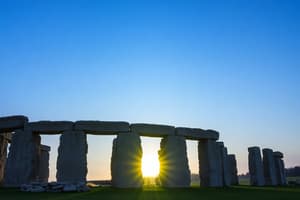Podcast
Questions and Answers
How many sarsen stones were erected within the henge during Phase Three?
How many sarsen stones were erected within the henge during Phase Three?
- 20
- 30 (correct)
- 40
- 50
What was the diameter of the sarsen circle erected during Phase Three?
What was the diameter of the sarsen circle erected during Phase Three?
- 97 feet
- 108 feet (correct)
- 120 feet
- 150 feet
What is the approximate weight of each standing stone in the sarsen circle?
What is the approximate weight of each standing stone in the sarsen circle?
- 10 tons
- 20 tons
- 25 tons (correct)
- 35 tons
Which feature was part of the rearrangement at the end of Phase Three?
Which feature was part of the rearrangement at the end of Phase Three?
How were the bluestones positioned in relation to the sarsen circle?
How were the bluestones positioned in relation to the sarsen circle?
What is the primary reason people visit Stonehenge each year?
What is the primary reason people visit Stonehenge each year?
When did the first phase of construction at Stonehenge begin?
When did the first phase of construction at Stonehenge begin?
What is the approximate diameter of the circular ditch created during the first phase of Stonehenge's construction?
What is the approximate diameter of the circular ditch created during the first phase of Stonehenge's construction?
What are the pits within the henge, known as Aubrey holes, named after?
What are the pits within the henge, known as Aubrey holes, named after?
What was a significant activity at Stonehenge during its second phase of construction?
What was a significant activity at Stonehenge during its second phase of construction?
How far away were the bluestones, thought to have been used in the Aubrey holes, mined from Stonehenge?
How far away were the bluestones, thought to have been used in the Aubrey holes, mined from Stonehenge?
Which of these features is NOT associated with the initial phase of Stonehenge's construction?
Which of these features is NOT associated with the initial phase of Stonehenge's construction?
What distinguishes Stonehenge from the construction of the pyramids in Ancient Egypt?
What distinguishes Stonehenge from the construction of the pyramids in Ancient Egypt?
Flashcards are hidden until you start studying
Study Notes
Overview of Stonehenge
- Stonehenge is a Neolithic monument located on Salisbury Plain, England, attracting over one million visitors annually.
- Its enormity and ancient origins inspire many, with visitors seeking connections to the prehistoric era and observing its astronomical significance.
- Construction began in the fourth millennium B.C.E., contemporaneous with Egypt's early dynasties, and predated the Great Pyramids.
Dimensions and Construction Details
- The site features a circular structure with a diameter of 97 feet, comprised of trilithons standing 24 feet high, dating from around 2550–1600 B.C.E.
- The circular ditch and bank, known as a henge, was dug circa 3100 B.C.E., measuring 360 feet across, with two entrances.
Phase One: Initial Construction
- Features a significant circular ditch approximately six feet deep with a bank inside.
- The construction included 56 Aubrey holes, likely intended for upright bluestones or wooden beams, with each bluestone weighing between 2 and 4 tons sourced from 250 miles away in Preseli Hills, Wales.
Phase Two: Development and Burial Practices
- Occurred 100–200 years later, marked by the erection of vertical wooden posts in the henge's center and entrances.
- This phase included burials, with at least 25 Aubrey holes repurposed for cremation and 30 additional pits dug for burials within the henge enclosure.
Phase Three: Final Construction
- Happened 400–500 years after the second phase, characterized by the addition of 30 large sarsen stones sourced from Marlborough Downs.
- The sarsen stones, each about 13 feet high, nearly 7 feet wide, and weighing approximately 25 tons, formed a circle of 108 feet in diameter.
- This phase included the erection of five sarsen trilithons arranged in a horseshoe shape, with stones weighing up to 50 tons each.
- Bluestones were either restored or freshly quarried and incorporated into the design.
- A long processional avenue, approximately 34 meters wide, was created leading from the northeast entrance down to the Avon river.
Studying That Suits You
Use AI to generate personalized quizzes and flashcards to suit your learning preferences.





